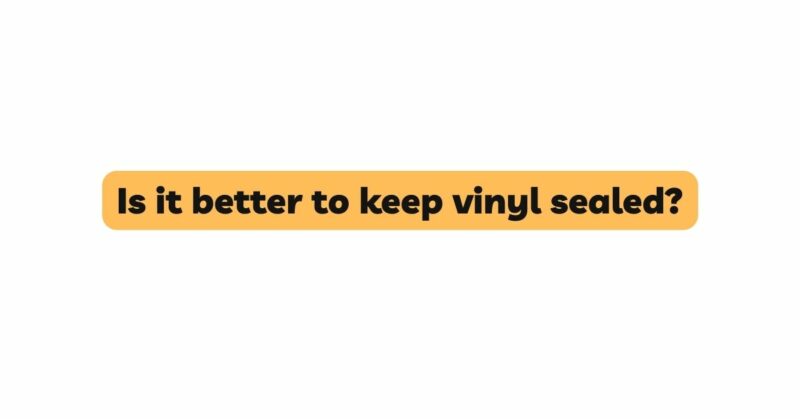The resurgent charm of vinyl records has rekindled a passionate community of audiophiles, collectors, and music enthusiasts who revel in the analog experience. Within this community, a recurring question emerges: Is it wiser to keep vinyl records sealed? The allure of preserving an unopened artifact versus the desire to engage with the music prompts this debate. This article delves into the complexities surrounding this decision, weighing the potential advantages and drawbacks of keeping vinyl records sealed, while considering the diverse motivations of collectors and the essence of the vinyl experience.
The Temptation of Unopened Vinyl: Unopened vinyl records hold a certain allure. Wrapped in plastic, they represent a capsule of time, unspoiled by the passage of years and untouched by human hands. This temptation arises from the fascination with maintaining the pristine state of the record and the potential investment value it might carry. However, the decision to leave a record sealed versus unsealing it involves more than just the preservation of its condition; it touches on the core principles of appreciation, enjoyment, and collection.
Advantages of Keeping Vinyl Records Sealed:
1. Preservation of Originality: Perhaps the most apparent advantage of keeping vinyl records sealed is the preservation of their original state. The album cover, inner sleeves, and vinyl itself remain untouched by environmental elements and human interaction. For collectors who cherish the aesthetics and historical aspects of vinyl records, this preservation is a key incentive.
2. Rarity and Investment Potential: Unopened vinyl records, especially those from limited pressings, special editions, or signed copies, possess inherent rarity. The scarcity of unopened versions can elevate their market demand, potentially increasing their value over time. Collectors with an eye on potential future gains may opt to keep their records sealed to leverage their investment potential.
3. A Glimpse of History: Sealed vinyl records offer a glimpse into the past. The packaging, labeling, and cover art reflect the artistic sensibilities of the era in which they were released. For collectors who hold a deep appreciation for the cultural and historical context of music, unopened records serve as a preserved time capsule of that period.
Considerations and Potential Drawbacks:
1. Foregoing Musical Experience: The core purpose of vinyl records is to provide a sensory musical experience. Keeping records sealed denies the listener the opportunity to engage with the auditory and emotional nuances of the music. The tactile sensation of handling the record, the warmth of analog sound, and the immersive journey of the music are all sacrificed when records remain sealed.
2. Limited Interaction with Artwork: Album artwork is an integral aspect of vinyl records. Unsealing an album cover invites collectors to engage with the cover art, read liner notes, and explore the visual elements that complement the music. Sealed records deprive collectors of this tactile interaction and the unique connection it fosters.
3. Potential Deterioration: Ironically, sealing vinyl records does not guarantee their indefinite preservation. The plastic shrink-wrap can degrade over time, potentially impacting the condition of the cover art and inner sleeves. Environmental factors such as temperature fluctuations and humidity can also affect the vinyl and packaging even within a sealed state.
Striking a Harmonious Balance:
1. Reflecting Personal Priorities: The decision of whether to keep a vinyl record sealed or unseal it should align with your personal priorities. If the tactile interaction with music, emotional connection, and immersive sound experience matter most to you, unsealing records may be more suitable. If rarity, investment potential, and historical preservation are paramount, sealing records might be a better fit.
2. Gauging Collectibility and Rarity: Not all vinyl releases carry the same level of rarity or collectibility. Special editions, limited pressings, or albums of significant historical value may hold more weight when left sealed. Research the release’s market demand and rarity to inform your decision.
3. Responsible Handling and Storage: For collectors who choose to maintain vinyl records in their sealed state, proper storage is imperative. Store records upright in a cool, dry environment, and consider using archival-quality plastic sleeves to mitigate potential shrink-wrap degradation.
Conclusion: The choice of whether to keep vinyl records sealed is an intricate one, shaped by individual motivations, values, and goals. While sealed records embody the allure of preserving originality and potential investment value, they can also curtail the joy of the immersive musical experience and the tactile interaction with album artwork. Ultimately, the worth of vinyl records transcends their physical condition, encompassing the emotions, memories, and connections they cultivate with music and culture. Whether sealed or unsealed, each record possesses a unique place in the heart of collectors, resonating with the diverse ways in which music enriches our lives. As collectors, enthusiasts, and audiophiles, the power to make the decision lies in embracing the essence of vinyl’s magic, whether unsealed or unopened.


